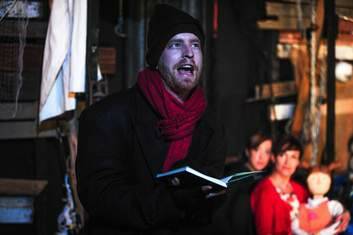Home at the End. By Duncan Ley. Directed by Jarrad West. Canberra Theatre Centre and Everyman Theatre. Courtyard Studio. Wednesday to Friday, September4 to 7 and September11-14 at 8pm. September14 at 2pm. Bookings 62752700 or canberratheatrecentre.com.au.
Subscribe now for unlimited access.
or signup to continue reading
Home at the End is a new piece from local playwright Duncan Ley that explores guilt, history, love and violence with humour and thoughtfulness. It's long (going on three hours) and probably needs a bit of trimming but director Jarrad West and a team of strong players make an absorbing job of it.

To give too much of it away would be a pity. There's a man living rough in an old shed near the water and a child and her mother who listen to his stories. There's the child's father, a writer, exploring his ancestor's Nazi background. There's a warm and funny family relationship and a terrible life-altering event. There are ghosts. The man in the shed tells stories that are brought to life by masked commedia players, stories about human cruelty and the turning points of life. And a Nazi turns out to have a love for music, blind to the ironies of compelling it to be played by a doomed and frozen concentration camp inmate.
This is ensemble work that revels in the luxury of using some of Canberra's best. The group includes Geoffrey Borny, Jordan Best, Duncan Driver, Laura Dawson, Amy Dunham, Vanessa Driver, Will Huang and Chris Zuber, and the play allows all of them to shine in key moments, as well as contributing powerfully to the group. Helen McFarlane and Isaac Reilly are the couple at the heart of the piece, but also repeatedly become part of the lovely collaboration that is a mark of Everyman's productions.
Moments to notice include Dunham's sensitive work with the child puppet; Borny as a flustered therapist presiding over a disintegrating group therapy session; Driver as the camp inmate forced to play the violin; and Zuber as the morally blind Nazi.
McFarlane and Reilly create the couple very well, he wrestling with the problem of writing about the incomprehensible, she challenging him with humour and humanity.
The dark undercurrent of the commedia scenes and their stories pour into all of their lives without reason and if there is any hope at all, it is in the passing on of those stories.
The Courtyard Studio's difficult sight lines mean that not all of the images have the impact they might need and occasionally it is hard to see key players, particularly in the old shed scenes, but there is a mood, tension and atmosphere that keeps an audience very much connected.
It is good to see Everyman continuing a commitment to original work and quality in local theatre.

